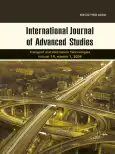Algorithm for Calculating the Coefficient of Labor Participation of Operators of Lines, Machines and Plants Using the 1C:Enterprise System
- Authors: Chikina A.I.1, Ishmuradova I.I.1
-
Affiliations:
- Naberezhnye Chelny Institute, Kazan Federal University
- Issue: Vol 14, No 1 (2024)
- Pages: 184-195
- Section: Articles
- Published: 31.03.2024
- URL: https://journal-vniispk.ru/2328-1391/article/view/299570
- DOI: https://doi.org/10.12731/2227-930X-2024-14-1-277
- EDN: https://elibrary.ru/SCJMOE
- ID: 299570
Cite item
Full Text
Abstract
The purpose of the study was to improve the remuneration system for operators of automatic lines, machines and plants by using the labor participation rate, which will allow making optimal management decisions on accounting for payroll settlements with staff and the achieving of strategic goals of the organization. The article suggests the ways to solve the problem using the example of improving the system of awarding bonuses to the staff of a manufacturing enterprise, it is recommended to use formulas that allow evaluating the productivity of an individual employee. Software implementation in the 1C:Enterprise system is performed. The developed software solution allows you to automate the process of calculating bonuses for operators of lines, machines and plants, taking into account the amount of work each employee does. The proposed algorithm for calculating the labor participation coefficient is supposed to be developed in further studies to more accurately assess the contribution of an employee's labor, for example, by taking into account defects and evaluating the quality of manufactured products.
Purpose. Development of an algorithm for calculating the coefficient of labor participation of operators of lines, machines and plants using the 1C:Enterprise system.
Methodology: in article methods for formalizing and specifying formulas used in calculating the labor participation rate, and also development methods on the 1C:Enterprise platform were used.
Results. The software implementation of calculating the premiums of operators of lines, machines and plants taking into account the labor participation coefficient is performed.
Practical implications it is expedient to apply the received results the manufacturing enterprises staffed by operators of automatic or semi-automatic lines, machines and plants.
About the authors
Ayzilya I. Chikina
Naberezhnye Chelny Institute, Kazan Federal University
Author for correspondence.
Email: chikina_ayzilya@mail.ru
master’s student «Business Informatics and Mathematical Methods in Economics»
Russian Federation, 68/19, Mira Str., Naberezhnye Chelny, Tatarstan, 423810, RussiaIzida I. Ishmuradova
Naberezhnye Chelny Institute, Kazan Federal University
Email: izida-89@mail.ru
Associate Professor « Business Informatics and Mathematical Methods in Economics», Candidate of Economic Sciences
Russian Federation, 68/19, Mira Str., Naberezhnye Chelny, Tatarstan, 423810, RussiaReferences
- Aksenov P.V. Moskovskoe nauchnoe obozrenie [Moscow Scientific Re-view], 2011, no. 1(5), pp. 02-05.
- Dadyan E.G. Razrabotka biznes-prilozheniy na platforme “1S:Predpriyatie”: uchebnoe posobie [Development of business application on the 1S:Enterprise platform: schoolbook]. Moscow, 2024, 305 p.
- Zakharov A.V., Kozlov A.I. Innovatsii. Nauka. Obrazovanie [Innovation. Science. Education], 2020, no. 21, pp. 643-648.
- Luzenina E.V., Vysotskaya A.V. Nauchno-tekhnicheskoe tvorchestvo aspir-antov i studentov: materialy 47-y nauchno-tekhnicheskoy konferentsii studen-tov i aspirantov [Scientific and technical creativity of graduate students and students: materials of the 47th scientific and technical conference of stu-dents and graduate students]. Komsomolsk-on-Amur, 2017, pp. 700-704.
- Lukmanova F.F. Novyy universitet. Seriya: Ekonomika i parvo [New Univer-sity. Series: Economics and law], 2012, no. 6, pp. 53-55.
- Minina A.Yu. Sovremennaya ekonomika Rossii: problemy i perspektivy razvitiya: sbornik nauchnykh trudov Vserossiyskoy studencheskoy nauchno-prakticheskoy konferentsii [Modern Russian economy: problems and devel-opment prospects: collection of scientific papers of the All-Russian Student Scientific and Practical Conference]. Makhachkala, 2018, pp. 114-122.
- Polyakova I.A., Voronina A.V., Okhotnikov A.V. Nauka i obrazovanie: khozyaystvo i ekonomika; predprinimatel'stvo; pravo i upravlenie [Science and education: farming and economics; entrepreneurship; law and man-agement], 2018, no. 2(93), pp. 17-19.
- Polyakova I.A. Vestnik Severo-Kavkazskogo gumanitarnogo instituta [Bulle-tin of the North Caucasus Humanitarian Institute], 2016, no. 1, pp. 150-154.
- Sorokina O.G. Vestnik Severo-Kavkazskogo gumanitarnogo instituta [Bulle-tin of the North Caucasus Humanitarian Institute], 2016, no. 1, pp. 163-170.
- Chikina A.I., Ishmuradova I.I. Ermakovskie chteniya v Naberezhnykh Chelnakh. Kul'turno-istoricheskaya i sotsial'no-ekonomicheskaya dinamika regionov: vyzovy i vozmozhnosti: sbornik dokla-dov III Mezhdunarodnoy nauchno-prakticheskoy konferentsii [Ermakov readings in Naberezhnye Chelny. Cultural-historical and socio-economic dynamics of regions: chal-lenges and opportunities: collection of reports of the III International Scien-tific and Practical Conference]. Kazan, 2023, pp. 445-448.
- Aaroson S., Fallick B., Figura A., Pingle J., Washer W. The Recent Decline in the Labor Force Participation Rate and Its Implications for Potential La-bor Supply. Brookings Papers on Economic Activity, 2006, no. 1, pp. 69-154.
- Fedoskin V.V., Bakulina G.N., Pikushina M.Yu., Polyakov M.V. Im-provement of Methods for Analysis of Wage when Using Digital Technolo-gies. Digital Technologies in Agriculture of the Russian Federation and the World Community. Stavopol, 2022, p. 040012.
- Meloni W.P., Stirati A. The decoupling between labour compensation and productivity in high-income countries: Why is the nexus broken? British Journal of Industrial Relations, 2022, pp. 425-463.
- Mura L., Gontkovicova B., Spisakova E.D., Hajduova Z. Position of em-ployee benefits in remuneration structure. Transformations in Business and Economics, 2019, pp. 156-173.
- Shlepneva T.O., Maizel I.V. Methodological recommendations for the anal-ysis of the wage fund at the enterprise. IOP Conference Series: Earth and Environmental Science : International Baikal Investment and Construction Forum "Spatial Restructuring of territories". Irkutsk, 2021, p. 012175.
Supplementary files










